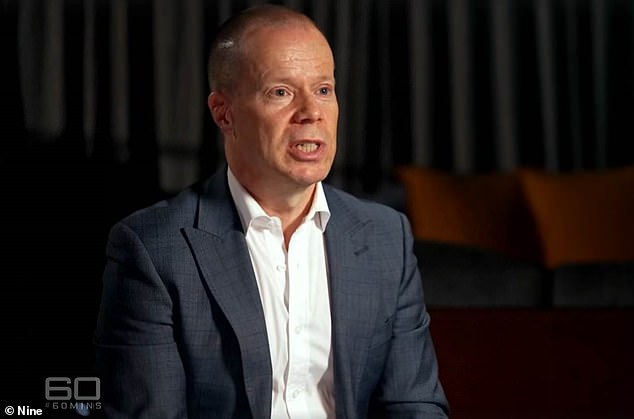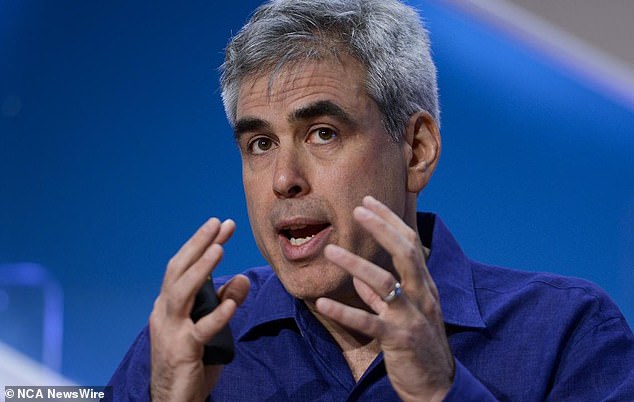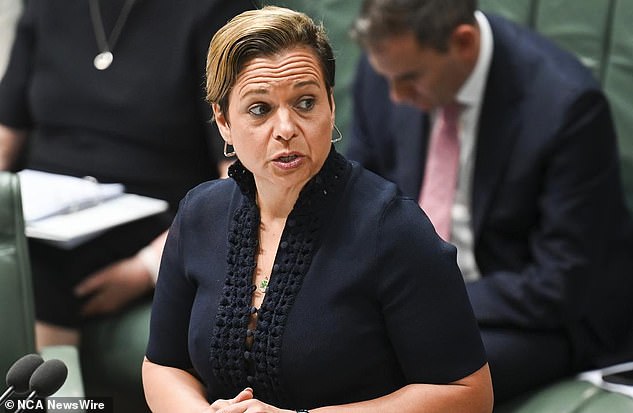Heartbroken father Robb Evans says he believes social media contributed to his daughter’s death as government considers age limits
A grieving father has revealed his teenage daughter’s disturbing search history before she killed herself, claiming social media took advantage of his daughter’s vulnerability about her understanding of healthy living.
Fitness coach Robb Evans made the disturbing revelation on Nine’s 60 Minutes, telling the program that his daughter Liv believed what she saw online rather than what he told her about living a healthy life.
Mr Evans claimed that social media giant Instagram preyed on his daughter ‘intentionally or not’, leading to the shocking act following a culmination of anorexia brought on by schoolyard bullying.
It comes amid calls to ban social media for teenagers across Australia, as two US states prepare to enforce new rules on thousands of children online.
“People who say, I’m healthy and I live on 200 calories a day,” Evans told the program
“I said, ‘Liv, they’re lying.’
“I said, ‘You have to understand that these people may say they’re healthy,’ but I said, ‘You can’t survive on 200 calories a day and here’s why.'”
Liv Evans was bullied at school and her father believes her use of social media led to anorexia

Robb Evans said he wants to see laws introduced in Australia restricting children from using platforms such as Facebook
Mr Evans said Australia should ban children from social media apps.
“I would compare the situation we are in now to when we made the changes to the gun laws,” he said.
“Yes, it will cause some backlash, but we have to do this.
“It’s the right thing to do and you just have to take a stand.
‘Instagram provides the perfect platform for people who are vulnerable to feeling worse.
“I mean, there’s certainly a lot to answer for.”
American social psychologist and author Jonathan Haidt said there are important links between social media use and the rise of teenagers suffering from mental health problems.
“We are facing an international epidemic of depression, anxiety, self-harm and suicide,” Mr. Haidt told 60 Minutes.
‘What we saw was the almost instantaneous transformation of childhood into a form that I believe is incompatible with healthy human development.
“Something happened in the early 2010s that sent teen mental health into a tailspin.”
Mr Haidt said research has shown that teenagers around the world are experiencing higher levels of mental health problems than generations before them.
“Something has happened worldwide that has caused mental health to deteriorate,” he said.

Researcher Jonathan Haidt says young teens are deeply influenced by social media
‘The only theory on the table as to why there would be a global change is the massive change in their daily lives as they adopted a phone-based childhood, based on having a smartphone, the front camera, social media and high speed. internet.
‘They spend more time on it and experience much more damage from it.
‘Chronic social comparison: all the other girls look better than you.
“They all use filters or carefully edited photos.”
Meta – the owner of Facebook and Instagram – has said it has taken action to find and remove harmful content on social media.
Earlier this year, the company announced that they would start hiding more types of content from teens and placing their accounts on the most restrictive content control settings.
“We regularly consult with experts in adolescent development, psychology and mental health to make our platforms safe and appropriate for young people, including improving our understanding of what types of content may be less suitable for teens,” Meta said in a statement. .
‘While we allow people to share content that discusses their own struggles with suicide, self-harm and eating disorders, it is our policy not to recommend this content and we have focused on ways to make it harder to find .
“We already hide results for suicide and self-harm search terms that inherently break our rules, and we’re expanding this protection to include more terms.”
This global crisis has prompted politicians in Florida to call for a ban on teenagers’ access to social media for children under 14, while 15 and 16 year olds need parental consent.
Texas also recently legislated to require parental consent before a user under the age of 18 can open an account.
Communications Minister Michelle Rowland says the Australian government will be closely monitoring how these bans work and whether they are effective.

Communications Minister Michelle Rowland (pictured) said she would be open to introducing age restrictions on social media if laws being introduced in Florida in the US were successful
“One of the key questions here is about enforceability, about the incentives and about actually getting the platforms to comply with these rules, and that includes whether the penalties are sufficient,” Ms Rowland told 60 Minutes .
‘We are considering all available options.
“We will continue to closely monitor what is happening in Florida.
‘If it works and has the desired effect, then it is certainly something we will take into account.’
It comes after South Australia also moved to ban social media for children under 14.
The state government has appointed former Supreme Court Chief Justice Robert French to conduct a legal inquiry into the ban on children’s accounts.
Mr French will explore what regulatory and technological ‘routes’ the government could take to implement its ban.
The government’s policy would also require parental consent for children aged 14 and 15.
Meanwhile, in NSW, Premier Chris Minns said the summit will be held in October ‘to address the increasing harm that online platforms are causing to children and young people’.
Environment Minister Tanya Plibersek said the government takes children’s mental health seriously.
“You forget how short this stuff has been around, just like the first iPhone in 2007, and social media really took off in 2009,” Ms Plibersek told 2GB.
‘It wasn’t that long ago.
‘In that time we have seen dramatically poor outcomes for children’s mental health and wellbeing.
‘We’re really seeing the numbers skyrocket.
‘I can’t say that one exactly causes the other, but there is certainly a connection, and it was there before Covid.
‘Many people say children are isolated because of Covid, but this was evident even before Covid.’
